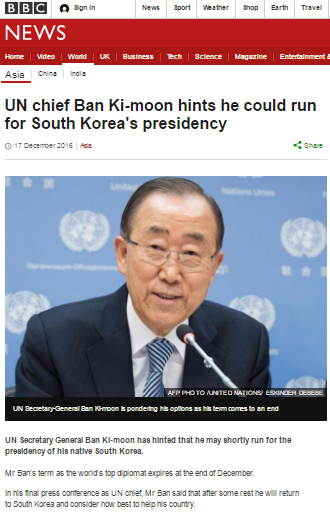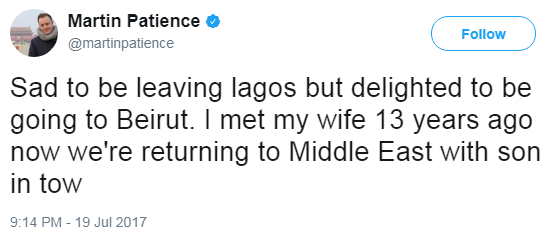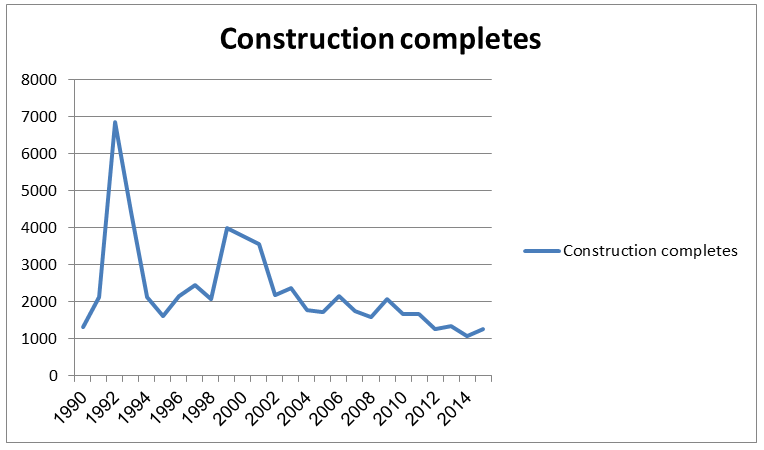Readers may recall that in February 2016 the BBC’s UN correspondent Nick Bryant told listeners to BBC World Service radio that:
“The Israelis always believe that they are victimized at the UN; that they are singled out unfairly; that they are isolated…”
However, as has been noted here before, Bryant did not provide BBC audiences with any relevant factual information which would enable them to understand the reality behind his portrayal of what Israelis “always believe”.
As the current UN Secretary General’s term of office comes to an end, the BBC has found a ‘hint’ made at a final press conference newsworthy.
“UN Secretary General Ban Ki-moon has hinted that he may shortly run for the presidency of his native South Korea.
Mr Ban’s term as the world’s top diplomat expires at the end of December.
In his final press conference as UN chief, Mr Ban said that after some rest he will return to South Korea and consider how best to help his country.”
Not newsworthy for the BBC, however, was Ban’s acknowledgement of bias against Israel at the body he has headed for a decade in his last address to the UN Security Council.
“During the past ten years, I have argued that we must never accept bias against Israel within UN bodies. Decades of political maneuverings have created a disproportionate volume of resolutions, reports and conferences criticizing Israel. In many cases, rather than helping the Palestinian cause, this reality has hampered the ability of the UN to fulfill its role effectively.”
As noted at the Tower:
“Ban criticized the UNHRC’s singular focus on Israel shortly after assuming his post in 2007, saying that he was “disappointed at the council’s decision to single out only one specific regional item, given the range and scope of allegations of human rights violations throughout the world.” […]
Earlier this year, U.S. Ambassador to the UN Samantha Power underscored the injustice of the UN’s singular focus on Israel:
“As you all know, the UN Charter guarantees “the equal rights of nations large and small,” and yet we have seen member states seek to use the UN Security Council, the General Assembly, and even the most arcane UN committees in ways that cross the line from legitimate criticisms of Israel’s policies to attempts to delegitimize the state of Israel itself. The only country in the world with a standing agenda item at the Human Rights Council is not North Korea, a totalitarian state that is currently holding an estimated 100,000 people in gulags; not Syria, which has gassed its people – lots of them. It is Israel.
Bias has extended well beyond Israel as a country, Israel as an idea – it even extends to Israeli organizations. Some of you may know the group ZAKA – an Israeli humanitarian group that helps save lives in disasters and ensures proper burial for the victims of those tragedies. ZAKA not only works here in Israel, but it responds to natural and manmade disasters worldwide, as it did in New York after 9/11, and in Haiti after the 2010 earthquake. Yet when ZAKA was nominated in 2013 for accreditation by the UN’s NGO committee – and this accreditation is what gives NGOs the right to participate in UN meetings, the right to assert their voices, the right to raise causes that really can matter in the world – when ZAKA was put forward it was denied approval. Five subsequent times the committee met, and five times member states blocked ZAKA – not because of the quality of its work, people weren’t that interested in the quality of its work, but simply because ZAKA is an Israeli organization.”
Particularly as the BBC is prone to frequent uncritical amplification of UN officials’ statements concerning Israel, Ban’s acknowledgement of anti-Israel bias at that body is precisely the type of information that audiences need in order to enhance their understanding.
Related Articles:
What BBC audiences aren’t told about the UNHRC




